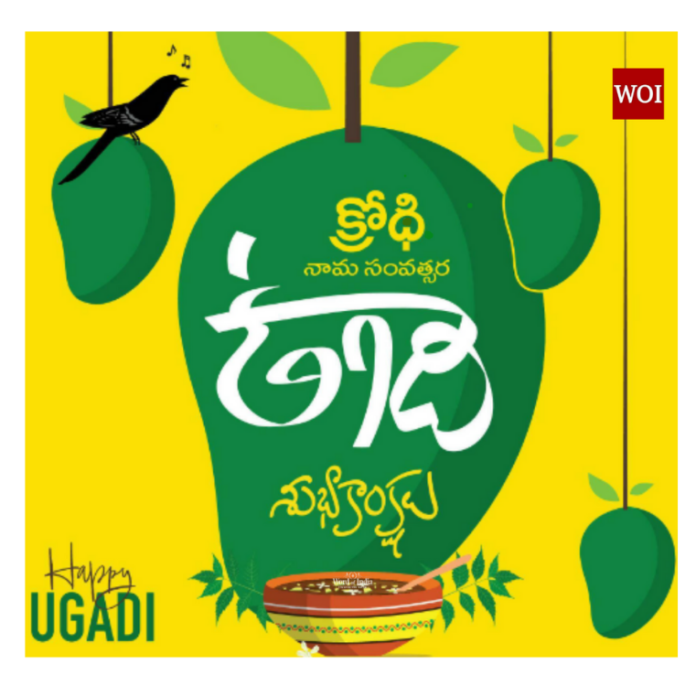Ugadi, Traditions, Samvatsara, Renewal
April 9, 2024: Welcome to Ugadi, celebrated with great pomp and show throughout Andhra Pradesh, Telangana, and Karnataka . Thus, Ugadi is celebrated in the month of Chaitra,month that marks the beginning of the Telugu New Year the first month of the Hindu Lunar Calendar, marking the first day of the month and hence the beginning of a new lunar cycle.
It symbolizes the commencement of new hopes for a hope-filled, prosperous year with a promise of a better tomorrow. Named Ugadi, the festival is called by different names at other places within India, namely Poila Boishak in West Bengal and Gudi Padwa in Maharashtra. In this manner, it is a celebration of Indian diversity with so much recognition of the holiday and regional flavor that comes with it.
The main uniqueness of this festival is based on a sixty-year cycle known as the cyclical calendar of Samvatsara in which a name is given to individual years showing it as part of a cycle of time and existence.
According to Drik Panchang, Ugadi in 2024 has its date and time with the Pratipada Tithi starting at 11:50 PM on April 8 and ending at 8:30 PM on April 9. So maybe it is due to such exact timing that the commemoration of the various rituals and practices attached to Ugadi is made possible.
 “Ugadi Pachadi” is a very authentic dish of the festival Ugadi, by which Telugus and Kannadigas in India honor the good month of the year. This very special dish symbolizes the essence of life, where in life’s flavors lies embedded sweetness, sourness, bitterness, pungent, saltiness, astringency. Each of this means something different in life:
“Ugadi Pachadi” is a very authentic dish of the festival Ugadi, by which Telugus and Kannadigas in India honor the good month of the year. This very special dish symbolizes the essence of life, where in life’s flavors lies embedded sweetness, sourness, bitterness, pungent, saltiness, astringency. Each of this means something different in life:
– Sweetness (Madhura): Often provided by jaggery or ripe bananas, signifies happiness and joy.
– Sourness (Amla): Usually comes from tamarind, symbolizes challenges and difficulties.
– Bitterness (Tikta): Derived from neem flowers or leaves, represents the hardships and struggles in life.
– Heat (Katu): The taste of green chili or pepper in the dish represents the anger and emotional heat that a person would feel.
– Saltiness (Lavana): Salt is used to convey life’s interests and excitement.
– Astringency (Kashaya): Brought in a dish through the raw mango or turmeric in the dish, symbolizing unforeseen changes in life.
To prepare Ugadi Pachadi is, in fact, an act amounting to the philosophy that life is a mix set of experiences comprising joy, sorrow, anger, fear, disgust, and surprise that one should accept with equanimity. Tasting the Ugadi Pachadi is experiencing all the flavors of life and to be equanimous and optimistic in the new year. This dish represents not only a kind of culinary tradition of a country but also a very deep cultural and even philosophical reflection on human diversity and fullness in life.
The Essence and Traditions of Ugadi
Ugadi dates back to history in the 12th century when the day was reckoned to be the beginning of a new era by none other than the respected Indian mathematician Bhaskaracharya. This day is very religious because it is considered that Lord Brahma started creating this universe, presenting a new beginning and creation in both cosmic and individual worlds. The festival is celebrated in an array of unique traditions, appropriately depicting the cultural importance of the festival. The day starts with an auspicious bath made of oils and consumption of bitter neem leaves that purify the body and soul, accepting the varied flavors of life.
It is hoisted with colorful flags and Panchanga Sravanam is said for the year.
All of these, combined with the wearing of new clothes, the decorating of homes, really do manage to get one into the spirit of renewal and looking forward, hopefully, to the year. A very major contribution culturally to be noted is that an astronomer from Hyderabad has prepared a Telugu Panchangam in the English language, connecting traditional knowledge with modern needs. The present effort will also find many takers among the younger generation and thus will easily bring this cultural wisdom and the festivity associated with Ugadi to even the non-resident Indians. With the Ugadi year 2024 fast approaching, it is time to embrace traditions that have shaped our pasts and turn an eye towards new beginnings. This is a period that one is supposed to be happy and feel welcome in sharing and welcoming the family and friends to hold tradition by heart in remembrance of the cycle of nature of life and the universe with open and jovial energy for the coming New Year.


